 (3.10 avg; 21 ratings) rate it
(3.10 avg; 21 ratings) rate it
 (4.13 avg; 64 ratings) rate it
(4.13 avg; 64 ratings) rate it
 (3.37 avg; 27 ratings) rate it
(3.37 avg; 27 ratings) rate it
 (2.31 avg; 8 ratings) rate it
(2.31 avg; 8 ratings) rate it
Robyn Weintraub’s New York Times crossword—Amy’s write-up
Robyn makes it look effortless, doesn’t she? Just drops a bunch of crisply fresh fill into a grid, concocts some clever clues, and calls it a day. My list of fave fill is long today: TAKE A BREAK, SHORT-LIST, PINSTRIPE SUIT, FAKE EYELASHES, and STAR POWER anchor the Acrosses, and intersect terrific Downs like LEATHER SEATS, PSORIASIS (what? it’s a legit thing, it’s fairly common, and it’s got an oddball letter combo, that initial PS), two-sport BANK SHOT, FREE SHIPPING, WIKIPEDIA, and PAPA BEAR. Seven long Acrosses that tangle with eight long Downs, and worst thing that happens in the fill is some abbreviation pile-ups (APBS/LSAT crossing STE, FCC crossing CPI).
It’s post-debately late and it’s possible the debate offered me a headache, so let’s be expeditious here. Five things:
- 34a. [Batting equipment?], FAKE EYELASHES. What a great clue! And an even better entry.
- 12d. [Use of a cushion or a backboard], BANK SHOT. A cushion being the padded side of a pool table, and a backboard being behind a basketball hoop.
- 41a. [Melissa Jefferson ___ Lizzo], AKA. Flautist, singer, and pop/R&B phenomenon. Check out the “Good as Hell” video below, especially if you were in the marching band.
- Another three-letter abbreviation (initials) with a shout-out to an incredible woman: 49d. [Initials of the person who said “Fight for the things that you care about, but do it in a way that will lead others to join you”], RBG.
- 18d. [B+ or A-], BLOOD TYPE. I’m O+. If O+ were a grade given by a teacher, what would it connote?
4.25 stars from me. Happy Friday, y’all!
Barbara Lin’s Inkubator crossword, “Get Comfortable”—Jenni’s review
I didn’t figure out the theme until I found the revealer, and then I giggled. Very fun, and totally on-brand for the Inkubator.
Each theme entry is missing something that we’re all more comfortable without. The revealer is at 58a: [Like four theme entries and many who are working from home]: BRALESS.
The theme entries:
- 21a [Christmas tree tips?] is FIR ENDS (firebrands).
- 23a [Abstract SoCal design?] is LA DOODLE (labradoodle).
- 37a [Boogie, throw nails?] is GET DOWN TOSS TACKS (get down to brass tacks).
- 56a [Edith Piaf’s primitive side, to a Freudian?] is FRENCH ID (French braid).
Solid, consistent, and amusing theme. Nice!
A few other things:
- 11d [Back talk?] is a fun clue for ECHO.
- 20a [Plural possessive that can be singular] is THEIR. If you think that’s grammatically incorrect, a) you’re wrong and b) get over it.
- I’m sorry, but a BAGEL is not a [Roll with a hole]. It is not a roll at all. It is a bagel. That is different. Or at least it should be.
- Love the subtle signaling in [Nice houses] for CHATEAUX.
- I also enjoyed [Un-iron-ic state?] for ANEMIA. Thank you for not equating ANEMIA to weakness.
(This reminds me that I’ve seen multiple puzzles recently that did *not* refer to an EEG as a scan. I am deeply grateful.)
What I didn’t know before I did this puzzle: that STAN is Persian for “country.”
Arthur Klaassens’s Universal crossword, “Opening Moves”—Jim P’s review
Theme: FIRST DANCE (59a, [Traditional start of a wedding reception, or a hint to each starred answer’s opening letters]). Each theme answer’s first few letters spell out a word that can precede “dance.”
- 17a. [*Last Beatle to join the band] RINGO STARR. Ring dance. Hmm. I think “circle dance” gets more use, eh? But I’m fairly sure I’ve heard this term.
- 23a. [*Sound storage option] TAPE RECORDER. Tap dance.
- 37a. [*One may change the color of milk] BREAKFAST CEREAL. Break dance. Unlike the others, “break” is its own word in this compound word. Slight inconsistency here.
- 47a. [*Wilma Flintstone’s neighbor] BARNEY RUBBLE. Barn dance.
Once I realized I wasn’t meant to look at the whole first word (Barney dance? Tape dance?), I was okay with the theme.
Top fill: “KEEP TRYING!” and FOOD DESERT. The latter feels nicely modern. What doesn’t feel nicely modern is DA BOMB which is 90s slang whereas its clue [Totally rad] is 80s slang. ANIL and AUER make for tough proper name entries, but the crossings seemed fair enough.
One clue of note: 64a. [“One-Punch Man” genre]. ANIME. I don’t know the show, but I love the clue. (My daughter studied anime, especially gendered anime, in college.) This show, per Wikipedia, tells the story of “a superhero who can defeat any opponent with a single punch but seeks to find a worthy foe after growing bored by a lack of challenge due to his overwhelming strength.”
This appears to be a debut, so congrats are in order. Solid puzzle. 3.5 stars.
FIRST DANCE makes for a perfectly fine premise for a theme, but now I have “Last Dance” stuck in my head as an earworm, so I thought I’d share.
Anna Shechtman’s New Yorker crossword – Rachel’s writeup
I think this may be the first “lightly challenging” puzzle we’ve seen from Anna Shechtman, who usually bats lead-off for the New Yorker with a hard Monday, so it’s fun to get a look at one of her easy grids! This was a fun, quick solve that still retained some of Anna’s signature English lit angle.
Today’s grid is cute and supports a grid-spanning URBAN DICTIONARY (nice!) through the middle along with some good-sized corners. The NE contains VALHALLA / PLEIN AIR / SAD TO SAY, and the SW has UPPER LIP / REAL NAME / BALD SPOT. We also have the ultra-current MUTE BUTTON and (spoiler alert) Sherlock Holmes murder weapon POISON DART. All solid long entries, and it was easy enough to figure out how to spell PLEIN AIR from the crosses.
A few more things:
- We’ve got a couple bits of foreign language short fill that would normally take an accent in its original language (e.g. ÎLES, AÑO) that do not in their crosses, but I’m still holding out for a puzzle that *does* use the accent in both directions.
- Fill I could live without: ELD (which, despite its fun literary clue, is pretty hard to infer), AD IN (ick)
- Favorite clue: [What a Brit keeps stiff in the face of adversity, stereotypically] for UPPER LIP
- Not totally sold on DARNER as a thing
- Representation: Ok! The grid’s got MALIA Obama and some AMANDAs, but overall this puzzle is not particularly remarkable for inclusion of underrepresented groups.
- A little jarring to see a reference to OSAMA bin Laden in the puzzle
Overall, lots of stars for the substantial corners and central entry. This was a fun solve! Happy Mole Day to all who celebrate, and see you next week.
Gary Larson’s Los Angeles Times crossword — pannonica’s write-up
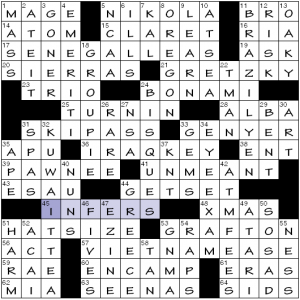
LAT • 10/23/20 • Fri • LAT •solution • 20201023
Aha, it’s the old words-as-homophones-of-demonym-suffixes theme.
(No, I’ve never seen this before, but it works well.)
- 17a. [Grasslands around Dakar?] SENEGAL LEAS (Senegalese).
- 36a. [Feature of a map of Baghdad?] IRAQ KEY (Iraqi).
- 57a. [Laid-back attitude in Hanoi?] VIETNAM EASE (Vietnamese).
- 11d. [Longing in São Paulo?] BRAZIL YEN (Brazilian).
- 32d. [Hot spot in Al Ahmadi?] KUWAIT TEA (Kuwaiti).
Two -eses, two -is, and one -ian. I’m fine with that distribution. Sometimes the capital city is used, other times not. Obviously, Kuwait City and Brasilia are no-gos, so that also makes sense.
This puzzle again came down on the more difficult than usual side. Seems like a real, intentional—and welcome—trend for Friday LATs.
- I see that the infer clue (45-across) has already been taken to task by commenters. I too come down on the side of maintaining a distinction between infer and imply.
- 5a [Serbian-born NBA center ___ Jokic] NIKOLA, not our old friend TESLA. 11a [Fella] BRO, not GUY. 14a [Speck] ATOM, not MOTE. These are typical of this crossword’s slightly tougher stance. I won’t be listing them all, nor even most of them.
- 23a [Chamber group] TRIO. A gorgeous and soothing melody from the unusual TRIO of flute, oboe, and guitar. This is Walter Torgeson’s Clear Out of Touch with Time:
Audio Player - 33a [Part of a late 1900s demographic] GEN YER. I don’t know that I’ve seen this particular construction before. Gen Y, yes, Gen Xer, yes. By these, it would seem legit, just less common?
- 53a [Late author whose daughter wrote, “As far as we in the family are concerned, the alphabet now ends in Y”] GRAFTON. She of the alphabetic Kinsey Millhone series, which ended prematurely. I confess that with -TON in place, I strongly considered Zora Neal HURSTON.
- 8d [Crater lake locale] OREGON.

- 44a [Middle of a three-part-start] GET SET. Bookended by “on your mark(s)” and “go”.
- 1d [One side of a physics equivalence principle] MASS. Wonder which one they have in mind.
- m = ρ × v
- m = w / g
- m = F / a
- m = (E / c2)
- etc.
- 18d [Exuberant fan] GROUPIE.

oh.
- 34d [Test involving gradually longer lines] EYE EXAM. Tricky clue.
- 37d [Round table VIP] KNT. Without question my least favorite entry. Oh wait, there’s also 53d [Fed. lending agency] FNMA.
- 40d [Creatures of habit?] NUNS. Creatures? Seems too much of a stretch in service of a pun.
- 44d [Homer’s home] GREECE. “Many accounts of Homer’s life circulated in classical antiquity, the most widespread being that he was a blind bard from IONIA, a region of central coastal Anatolia in present-day Turkey. Modern scholars consider these accounts legendary.” (–Wikipedia) Not critiquing the clue, just adding some interesting information.
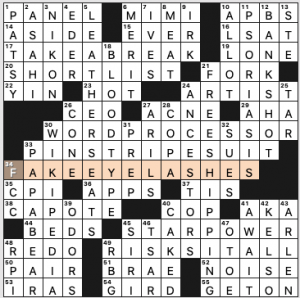
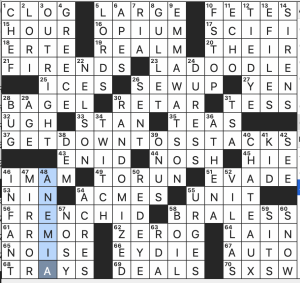
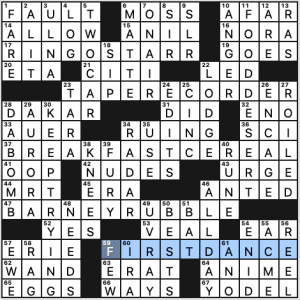
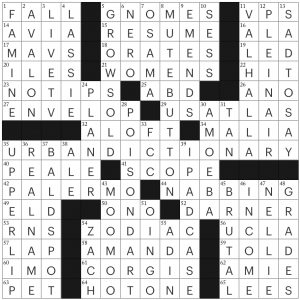
Tried to read Amy’s account of Friday’s NYT puzzle, but the link didn’t work, nor did links to any of the other puzzle discussions. I tried two different browsers, but no luck.
Fixed. If there’s ever an issue, you can navigate to the full post by clicking “Continue Reading”, or the post title, or the post date.
Inkubator: What an adorable puzzle from Barbara Lin! My favorite “entry” is 21 Across which–when “completed”–charmingly and aptly describes many of the wonderful creators at the Inkubator.
Thanks!
I was really enjoying the LAT until I got to 45a. INFERS is not [Subtly points out]. That would be IMPLIES. Gary and Rich should know better.
And don’t tell me that language evolves. I know that. This is still wrong.
Blame it on Sir Thomas More.
I would add that I don’t like using the word “evolve” with regard to language change. Languages constantly change, but the word “evolve” suggests a process of changing in a particular direction, that of becoming fitter and better adapted. Unless you’re talking about necessary coinages for things or ideas that didn’t exist before, language change is completely arbitrary. I have never heard anyone make an argument that the Great Vowel Shift, for example, or the loss of “thou/thee” made English any better-suited to its environment or more highly “evolved”, whatever that would mean. It just made it different. If “infer” has absorbed the meaning of “imply” that is neither progress nor decline, it’s just a thing that happened.
Are you implying that biological evolution, by comparison, is teleological? Because that is most certainly not the case.
Surely (biological) evolution is directed, towards whatever fitness means in the environment conditions of the time. Why must that presume a plan?
I’m not really seeing a difference, then, between language evolution and biological evolution.
Who’s to say all the information regarding a language’s fitness or environmental conditions are known?
I agree. I’m not going to try to argue Ethan’s point. Many times a word’s fitness is related to it being a shibboleth for teenagers. “On accident” started out that way, and then people stepped back and said, “Why not? We say ‘on purpose.'” You and I can hate a word, but there’s no stopping population dynamics.
I don’t claim to have an understanding of biology that exceeds the high school level (and barely that), but surely at least in its colloquial use “evolve” implies development towards sophistication and fitness. A phrase like “a highly evolved sense of smell” does not connote to you that a species’ sense of smell has come to perform its necessary functions better over time? Therefore, I feel that the pat response “language evolves” to someone’s grousing about language is meant to suggest that the complainer is trying to hold back an important process in a language’s progress towards the better. “Languages change” is a more honest thing to say, and suggests that the complainer is wasting their breath, but it doesn’t implicate them as an “enemy of progress.”
I’m finding it very ironic how the word ‘evolve’ is limited by its own linguistic constraints and associations.
LOL. I mean, it wasn’t me who raised the objection that my understanding of the word was out of line with the scholarly sense used by biologists.
But if you hear someone say something like “R&B has evolved since the ’90s” and you don’t think that’s a normative statement about the quality of R&B now vs. then, that’s your right but I think you’d be in the distinct minority.
@Ethan, I would not see “R&B has evolved” as a judgment that it used to be worse and now it’s better. For example, rock has evolved since the 1990s and found itself marginalized as younger generations tend to prefer hip-hop. Rock’s evolution is firmly in the direction of decreasing relevance.
Ethan,
Yes, evolution encourages “improvement,” but only in the context of the snapshot that defines the organisms’ environment. Every time the environment changes, current “state-of-the-art” becomes irrelevant. Humans are not the culmination of evolution’s workings, for instance; we are the result of evolution’s stochastic processes dealing with environmental upheavals. We’re not more successful than dinosaurs were for over 100 million years. We’re not more successful than flies. We’re pretty successful in our niche at the moment, but in no way a “culmination.” That’s all we mean when we advise reading too much into where evolution’s direction heads.
Infer hasn’t absorbed the meaning of imply. It was coined with that meaning and subsequently declared wrong by authorities in every century from the sixteenth through the twenty-first. That’s why the “evolution of language” arguments are so much fun to watch.
What Jenni said plus one. Why not just clue it in an accurate way?
I wondered if anyone else noticed 45-A in the LA Times.
Garner’s Modern English Usage: “Don’t be swayed by apologetic notes in some dictionaries that sanction the use of infer as a substitute for imply. Stylists agree that the important distinction between these words deserves to be maintained.”
For one such apologetic note, see Merriam-Webster on the two words.
I side with Garner. To me, the clue looks like a mistake, like someone confusing rebut and refute.
Perverse that they elected to use the autantonym sanction; it’s only in the context of the following sentence that their position is clear.
In Fowler’s 2/e, it’s “each word has its work to do,” and the dictionary record of the misuse comes “sadly.” I have to agree.
RHUD hedges. It says that the second meaning of “infer” has a long history but has run into criticism in the 20th century, and restricting its meaning has a long history, too.
There are limits, too, to how much weight one can give to older usage, since usage evolves. Worth noting that MW11C’s first quote is from Shakespeare, and I have no idea who H. R. Chellman is. Googling turns up only pages pouncing on the dictionary for citing this.
NYT: Excellent puzzle. My husband helped with IVES, and I Naticked at AKA/KELSO. But that’s on me. It generally flowed very easily. I too loved the FAKE EYELASHES clue and answer… what a turnaround from what I expected.
NYT two points:
– 8D – MEAT and GIST are not the same, I might contend that they are near opposites; One might catch the gist before filling in the meat – the framework/skeleton and the flesh.
Re: FAKE EYELASHES for Batting Equipment? Very 1940- early 60’s. Yes, it is a clever twist clue/answer. Why isn’t that demeaning to women, or is that somehow empowering?
NYer particularly smooth today
As long as we’re sanctioning words, I should mention Amy’s use of “flautist” sets the teeth of flutists on edge. It’s a totally unnecessary Italianate affectation and is not used by American musicians. It hangs on in the UK because they’re British.
I’m enjoying your use of the contronym “sanctioning” in this context :) . If you had left a period after “Amy’s use of “flautist”, we woudn’t know if you liked it or hated it :D :D .
iswydt
AMY: “If O+ were a grade given by a teacher, what would it connote?”
One did bloody awful on the test?
Universal: Had PRAIA til I realized it was going for DAKAR. Perhaps the clue should have specified continental Africa. After all, Port Louis (Mauritius, on the east side) is african as well.
KILLER NYT. LOVED IT